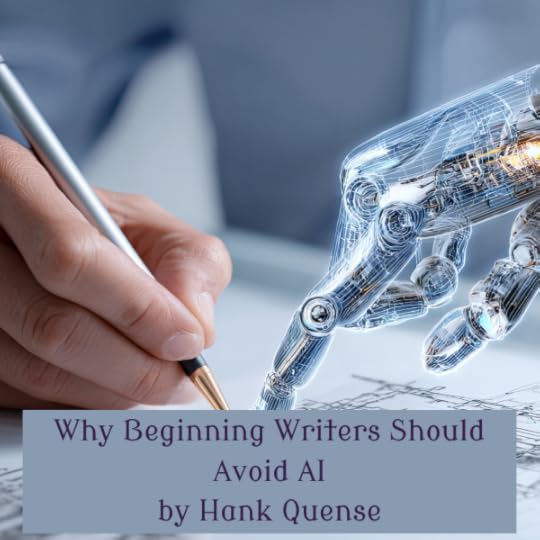Why Beginning Writers Should Avoid AI
 by Hank Quense, @hanque99
by Hank Quense, @hanque99
If you’re learning to write fictional stories, no matter what genre, one of the worst things you can do is use AI to help write the stories or to develop characters and plots.
Before you begin to use AI as a writing assistant, you have to develop your own, unique writing voice. If you don’t establish your own voice, your stories will use the AI’s voice.
I’ve said elsewhere that writing a story is an act of creation. An AI app does not create, It reads works by other authors and regurgitates them as your story.
It is essential that you continue to exercise your creativity. Using AI early in your writing career will stifle your creative growth.
Write at least ten or more complete stories before even thinking about finding an AI app. After ten completed stories, you will have a fair understanding of the story design and storytelling processes.
To emphasize my concern, let’s ask an AI app the following question:
What dangers do beginning fiction writers face if they use AI to write their stories?Beginning fiction writers who use AI to write their stories may face several significant dangers:
Loss of Personal Voice and Style: One of the hallmarks of an emerging writer is developing a unique literary voice. Over-reliance on AI can lead to homogenized prose and stories that sound generic, making it harder for writers to cultivate their own style.
Stunted Craft Development: Writing is a skill honed through practice, feedback, and revision. If writers depend on AI to generate content, they will miss out on valuable experiences in storytelling, scene construction, and character development, which are critical for long-term growth.
Ethical and Ownership Issues: Using AI-generated content, especially without clear attribution, raises questions about authorship and intellectual property. Writers may face challenges getting published by reputable venues or entering competitions that require original, human-created work.
Clichéd or Derivative Content: AI tools are trained on vast datasets, which can inadvertently lead to stories filled with clichés, familiar tropes, or even unintentional plagiarism. This can prevent fresh, original storytelling—a key goal for any writer.
Reduced Emotional Depth: AI-generated fiction often lacks the nuanced emotional resonance and depth of human-authored stories. Beginning writers who rely on AI may not learn how to imbue their narratives with authentic emotions, complex motives, or believable dialogue.
Dependency and Creative Block: Relying on AI as a “shortcut” can create dependency, making it difficult for writers to compose independently or overcome creative stagnation.
Misconceptions About the Writing Process: Viewing writing as a product rather than a process of discovery and effort can demotivate writers from engaging with the challenges and rewards of craft.
To truly grow as storytellers, beginning fiction writers should engage deeply with the writing process themselves, viewing AI as a potential brainstorming tool or editor—never as a replacement for their unique creative efforts.
This response came from Perplexity, my favorite AI app. If I ask ChatGPT, another popular AI app, the response is the same but worded differently.
If you are an experienced writer and need a guide to understand how to use AI as a writing assistant, my book The Author’s AI Toolkit is a great resource.
Follow Hank and find his other books on Amazon.
Why developing your own voice first is essential before turning to AI writing tools (by Hank Quense):
Share on X
The post Why Beginning Writers Should Avoid AI appeared first on Elizabeth Spann Craig.



